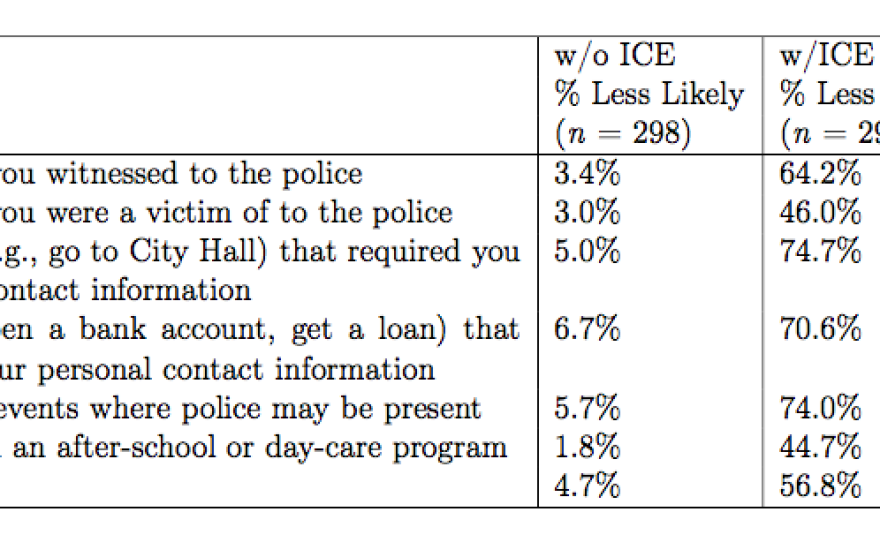The San Diego County Board of Supervisors recently joined a small group of jurisdictions in California, who oppose the state sanctuary laws. The county board voted to support the Trump administration lawsuit against SP 54 which sets limits on cooperation between local law enforcement and federal immigration officials. During public comment before the board comments, like this, were heard. This is an issue of public safety. The sanctuary state law protects criminal aliens. It does not allow our law enforcement to communicate properly. When immigrants are free to call the police or report crimes, and when their basic rights are abused by overreaching law enforcement, we are all less safe. So what is it? To sanctuary laws harm, or help public safety? One San Diego researcher has been looking into that question and he joins us now with his findings, Tom Wong, associate professor at San Diego, welcome to the show. Thanks for having me back but There is no legal definition about a Century City or one standard sanctuary policy, in general, what does the term mean? In general and he think about sanctuary policies, we are talking about how localities, the limit and articulate their interactions with ICE so when we think about a century jurisdiction, we are generally thinking about a place, that has set certain limits, like notifying ICE of undocumented immigrants that are in custody. So that would fall into the general concept of that sanctuary policy? Yes it would. You previously looked at crime in sanctuary and non-sanctuary jurisdictions, remind us about those findings. And what they were based on. Yes, so last year, I got a data set, via a freedom of information act request, so the data set is actually immigration and customs enforcement, so ICE, so identifying those jurisdictions that were Centauri counties versus non-sanctuary counties, and so, the punchline is that, crime is a lower in Centauri counties compared to comparable non-Centauri counties, using ICE's data set. Taking it a step further, you want to know that they have on the behavior of undocumented individuals themselves, how did you go about conducting the survey in San Diego County? Yes, thanks for the question, one of the sort of missing links from a research perspective is, the mechanism that ties lower crime into Centauri policies together, and so for over a decade now, groups like the international Association and Chiefs of police, the major police Chiefs Association, they have said that they need the trust of immigrant communities in order to make their work easier. And so, with this new work, it took a long time to do, because part of it is doing a representative survey of undocumented immigrants in San Diego County, so there is a hidden population, so there is no phonebook from which to conduct this survey from, but about a couple of years of work, articulating a sample frame, so that we can actually survey this population, is what informs my new work. And so, based on the survey, I conducted a survey experiment, so half of the respondents were randomly assigned to a condition, so refraining, how local law enforcement is working, or not working with ICE so under one condition we are saying that San Diego Police Department and San Diego County sheriffs are not working with ICE on deportation rates, and another condition, respondents are randomly assigned to hear that San Diego Police Department and the county sheriffs were working together with ICE on deportation rates. Tell us what you found? The results were credibly stark. So we see that 61% are less likely to report a crime that they witnessed two police, if local law enforcement were working together with ICE, 43% are less likely to report crimes that they are victim of, two police if local law enforcement is working with ICE. And, we were able to ask a broader range of behaviors, so very quickly, 70% or less -- are less likely to use with services, they're less likely to do business, 42% with children are less likely to enroll their children in afterschool or day care programs and 52% are less likely to look for a new job, if local law enforcement were working together with ICE so we see these chilling effects reverberate across the day-to-day sort of activities of undocumented immigrants. These were based on self-report hypothetical questions, is there any comparative data on the behavior of undocumented individuals interacting with police between cities that have sanctuary policies as opposed to cities that do not have sanctuary policies? Of course mourn -- more work needs to be done, we cannot settle a very hot button political issue, but we know from this particular work is that, for undocumented immigrants, when they are asked about how they are going to conduct their day-to-day lives, we see that from this work, if local law enforcement is partnering with ICE, their day-to-day lives are going to change dramatically. In a way that sort of pushes them further into the shadows, and that is what things like California and our California values act, are intended to prevent. Tom, I want to ask you this, he recently spoke at a press conference with State Senator Kevin, who introduced the state Centauri laws, does that close association run the risk of undermining the legitimacy of your research? It's interesting, for me to think about this question, because as a K PBS and a lot of folks know, I was undocumented, that is my sort of personal story, now does that sort of you know, preclude my ability to do research on undocumented immigrants? Well, my response is that, my immigration background, my personal experiences, that is my comparative advantage, that gives me a level of expertise over the issues that others may not have. And at the end of the day, the work that I do is quantitative, we are talking about numbers and the data are what the data are. And, we essentially, trained graduate students, and working professionals to make sure that if somebody is trying to cook the books, that we know how to detect that so in my own works, I would invite others to say here are the data, here are my methods and we should come to similar conclusions. I have been speaking with Tom Wong. Tom, thank you. Thank you.
A new survey finds 61 percent of people living in the country illegally in San Diego County are less likely to report a crime they witness, if local law enforcement officials work with immigration authorities on deportation raids.
The survey of people without legal permission from Mexico in San Diego County was conducted by UC San Diego associate political science professor Tom Wong.

The findings come a week after a controversial vote by the San Diego County Board of Supervisors to support the Trump administration’s lawsuit against California over its sanctuary immigration law, which limits cooperation between local law enforcement and federal immigration authorities.
The survey also found that if police work with ICE, 43 percent of people without legal permission are less likely to report a crime they were the victim of and 70 percent are less likely to seek certain public services. Among those with children, 43 percent of respondents said they were less likely to place their kids in an after-school or day-care program.
Wong’s previous research has found sanctuary counties are safer than non-sanctuary counties and he believes the recent survey results may help explain why.
Wong discusses his findings Thursday on Midday Edition.







